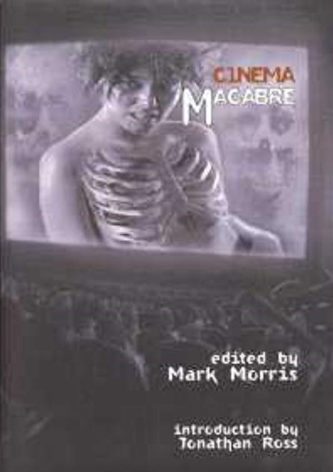 Edited By MARK MORRIS (PS Publishing; 2006)
Edited By MARK MORRIS (PS Publishing; 2006)
Getting a bunch of novelists to write horror movie commentary is frankly a pretty dodgy proposition. For corroboration check out the 1992 anthology CUT! HORROR WRITERS ON HORROR FILM, which has some good entries but is far too erratic to warrant a full recommendation. The similarly formatted CINEMA MACABRE is, thankfully, a much stronger volume overall.
The writers gathered here, each of whom are tasked with writing about a favorite horror film, include Neil Gaiman, who waxes enthusiastic about THE BRIDE OF FRANKENSTEIN; Ramsey Campbell, who provides an admiring dissertation on LOST HIGHWAY; China Mieville, who chooses to lavish praise on RAZORBACK(!); Douglas E. Winter, who provides a learned dissertation on RINGU; and the late Graham Joyce, who proclaims JACOB’S LADDER “the most terrifying movie ever made.”
Those are the good parts. There are certainly other worthwhile tidbits to be found among the remaining 45 essays, but the book also contains its share of clunkers. Foremost among them is Stephen Laws’ essay on PLAGUE OF THE ZOMBIES, a vastly overwritten ramble that failed to convince me of that film’s worth.
Markedly better written are Thomas Tessier’s thoughts on PRETTY POISON (1968), although I’m still not sure that film is worthy of inclusion in these pages, or if it’s even truly a horror movie (of which Tessier himself seems uncertain). Even more inexplicable is Jo Fletcher’s essay on CAROUSEL (1956), which is not a horror movie in any way, shape or form, although Fletcher tries very hard to convince us otherwise. Peter Atkins’ piece on Jean Cocteau’s ORPHEE begins by proclaiming that Cocteau detested analysis of his art, yet goes on to subject the film to all manner of analytic nitpicking, and drags Gnosticism, gender politics and neo-realist cinema into the fray.
Intellectual twaddle is a recurring problem in these essays, with frequent references to THE DUCHESS OF MALFI, LAST YEAR AT MARIENBAD and a claim (by science fiction legend Brian Aldiss, who should know better) that ANACONDA “rises from the great river of the unconscious”(!). I tend to side more with the views of Muriel Gray, who in her piece on Carpenter’s THE THING writes “the interpreters of modern horror cinema enjoy seeing things that are simply not there.”
Then there are those films chosen solely because they scared the essayist as a child. See James Lovegrove’s piece on THE OMEGA MAN, apparently “the first film that genuinely gave me nightmares, and for that it has my undying gratitude,” and the essay by CINEMA MACABRE’S editor Mark Morris on THE REPTILE, a choice that admittedly boils down “to when I first watched it and the circumstances under which I did so”—at age eleven.
Overall CINEMA MACABRE is worthwhile, but the unevenness of its content is a contant annoyance. Fore the record, 2010’s CINEMA FUTURA, a subsequent Mark Morris edited famous writer anthology devoted to science fiction movies, is a much better book.
